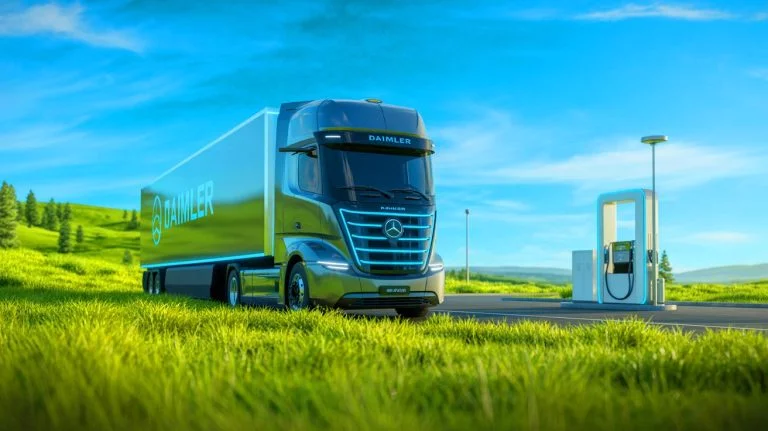| IN A NUTSHELL |
|
In recent developments, Daimler Truck has announced a delay in the production of its much-anticipated liquid-hydrogen trucks. This decision comes amidst concerns about the infrastructure required for hydrogen fuel and has sparked discussions among industry experts and environmental advocates. The delay signifies a shift in the timeline for the transportation sector’s transition to more sustainable fuel options. As the demand for eco-friendly solutions grows, this postponement raises questions about the readiness of global infrastructure and the commitment of major players like Daimler to green energy initiatives.
Daimler’s Shift in Production Plans
Daimler’s announcement to delay the production of liquid-hydrogen trucks until the early 2030s marks a significant change in their strategy. The company initially planned to launch these trucks earlier, aiming to be a frontrunner in the green transportation revolution. However, the revised timeline indicates a cautious approach, potentially due to the sluggish expansion of hydrogen infrastructure. This delay might influence other manufacturers and stakeholders who are closely observing Daimler’s movements in the hydrogen sector.
The initial production volume, when it finally enters production, will also be lower than first announced. This adjustment suggests that Daimler is recalibrating its expectations and strategy. The lower initial volume could reflect the current market’s readiness and the availability of necessary infrastructure. By adjusting the production targets, Daimler seems to be aligning its objectives with the practical realities of hydrogen deployment in transportation.
The Challenges of Hydrogen Infrastructure
One of the critical reasons behind Daimler’s decision is the “sluggish expansion” of hydrogen infrastructure globally. Building a robust network of hydrogen refueling stations is essential for the widespread adoption of hydrogen-powered vehicles. Without this infrastructure, the operational viability of hydrogen trucks remains limited. This challenge is not unique to Daimler. It reflects a broader industry issue where the pace of infrastructure development lags behind technological advancements.
Investments in hydrogen infrastructure are significant, and the return on investment is still uncertain for many stakeholders. The slow growth of this infrastructure could potentially delay the overall transition to hydrogen as a mainstream fuel source. Industry experts suggest that collaborative efforts between governments and private players are necessary to accelerate the development of hydrogen refueling networks.
Environmental Implications and Industry Reactions
The delay in Daimler’s hydrogen truck production carries environmental implications. Hydrogen is considered a cleaner alternative to fossil fuels, and its adoption is crucial for reducing carbon emissions in the transportation sector. The postponement might slow down efforts to cut emissions, which could be seen as a setback in the fight against climate change. Environmental advocates have expressed concerns, urging for more aggressive timelines in adopting green technologies.
Industry reactions to Daimler’s announcement are mixed. While some view the delay as a prudent move given current infrastructure challenges, others see it as a missed opportunity to lead in sustainable transportation. Competitors in the automotive industry may either accelerate their efforts to fill the gap left by Daimler or adopt a similar cautious approach. The decision underscores the complexities of transitioning to alternative fuels, where technological readiness must align with infrastructure availability.
The Future of Green Transportation
Despite the delay, the future of green transportation remains a significant focus for the industry. Companies like Daimler are investing in various technologies, including electric and hydrogen-powered vehicles, to reduce their carbon footprint. The shift towards sustainable transport solutions is inevitable, driven by regulatory pressures and consumer demand for eco-friendly options.
As the industry navigates these challenges, the role of policy and innovation becomes increasingly important. Governments play a crucial role in facilitating the growth of green transportation by incentivizing infrastructure development and supporting research. Meanwhile, technological advancements continue to improve the efficiency and cost-effectiveness of alternative fuels, paving the way for broader adoption.
The delay in Daimler’s hydrogen truck production highlights the complex interplay between technology and infrastructure in the quest for sustainable transportation. As the industry continues to evolve, how will stakeholders balance immediate challenges with long-term environmental goals? Could this delay prompt a reevaluation of strategies or accelerate efforts in other areas of green technology?
Did you like it? 4.5/5 (24)






Why is Daimler taking so long with this? The planet can’t wait! 😡
thank you for the detailed analysis on this complex issue. 👍
2030 is too late! We need action now, not later. 🌍
LOL, Daimler is like the tortoise in the green race. 🐢
Can anyone explain why hydrogen infrastructure is so slow to develop?
Is it just me, or does anyone else think this is a strategic blunder?
How can Daimler expect to remain competitive with these delays?
Delaying production is a huge mistake. They’re missing out on market potential.
Maybe Daimler is secretly working on something even better! 🤞
2030? I’ll be flying my hydrogen drone car by then! 😂
Isn’t it risky to rely so heavily on infrastructure that doesn’t exist yet?
More aggressive timelines are needed. The climate crisis won’t wait.
This is a classic case of too little, too late. Disappointing!
Could this delay have been avoided with better planning?
Thanks for highlighting the environmental implications. Important stuff. 🌱
Why aren’t more governments stepping in to build hydrogen infrastructure?
Daimler’s move seems cautious but also necessary given the circumstances.
2030s? That’s like waiting for the next ice age in the tech world.
Did Daimler just give up on leading the green transport revolution?
Infrastructure is key, but what about innovation in alternative solutions?
Maybe they should rename it to Daimler “Snail” Truck. 🐌
At this rate, my grandkids might get to see those trucks. 😂
It’s a shame, really. I expected better from Daimler.
Is this delay really due to infrastructure, or is Daimler facing other issues?
Hope this delay doesn’t discourage other companies from pursuing hydrogen tech.
2030s?! I guess patience is truly a virtue. 🤔
Thank you for keeping us informed about such critical industry changes. 📚
Delaying to 2030? Might as well be 3030!
What happened to the hydrogen revolution we were promised? 🚀
Is there any hope for green transportation if industry leaders are this slow?
I wonder if other companies will follow Daimler’s lead or accelerate their efforts.